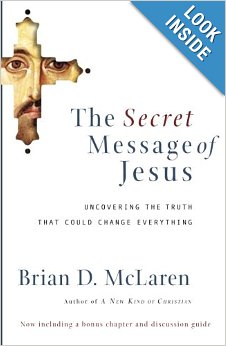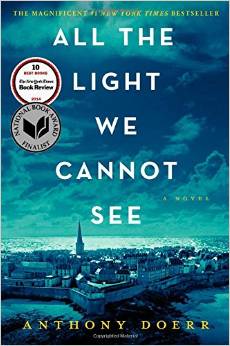This review originally appeared Mmmmm, That’s Good Coffee – Written by Rick Stilwell (reposted here by permission)
With his latest book, Brian McLaren has given his readers a title that’s more controversial than the contents, and a thought process that is challenging and life-stretching for anyone wanting to look beyond the typical doctrinal stances of the New Testament gospels.
 The Secret Message of Jesus
The Secret Message of Jesus (copyright 2006, W Publishing Group) reads to me as the work of the disconnected-third-party-narrator of McLaren’s New Kind of Christian trilogy. After following Dan Poole and Neil Oliver’s journeys and conversations together, the narrator is voicing what’s been hashed and re-hashed by that series’ protagonists. That’s the feeling I got as I read Secret, feeling that this was part of a larger progression that’s been going on for some time in McLaren’s writing. Where last year’s A Generous Orthodoxy read as more of an overall doctrinal or post-doctrinal work, his new book posits the single idea that Jesus, in sharing His message with parables and questions to graciously protect those who would not want to listen (Matthew 13), was able to "hide" pieces and parts of the Gospel across the centuries from anyone unwilling to live for Christ in the Kingdom.
The book is broken out into three sections, each building on the one before. Part 1 is "Excavation: Digging Beneath the Surface to Uncover Jesus’ Message". The particular choice of "excavation", rather than the overused "deconstruction", is helpful to give a new spin on what’s being done. Some of us as Christians have found the whole experience lacking – but we know it’s not God’s fault. If there is an ethereal "more" out there to be found, it’ll be found in Christ. And it’ll be found apart from a great deal of the historical and philosophical baggage that’s built up in the system over the past two-thousand-or-so years. Getting rid of the hindrances while still holding to the foundational premises is a tough chore, and too many folks deconstruct themselves out of Christianity and out of Christ altogether. McLaren doesn’t cross that line – instead, he brings to bear the singular thought that in using questions and parables, Jesus was hiding part of his message from those unwilling to listen with whole-hearts. Instead of a conspiracy theory that might lead us to huge digressions, we’re faced with simply re-reading and re-thinking the Gospel stories and listening with ears willing to hear this time around.
Part 2 is set as "Engagement: Grappling With the Meaning of Jesus’ Message". One of my own beefs over the past decade has been the inability of some to question, to doubt, to begin to fully contemplate what the teaching and implications of scripture might really be about for our lives. We walk into a sanctuary, hear a message, sing songs, pray and worship, and then leave – with very little to show for those hours, very little transformation or growth or maturity in our lives. After deconstructing, we’re left (hopefully) with a foundational thing that can now support the weight of a growing and fluid life in Christ. McLaren keeps on topic by sharing the secret message as a scandal – if they only knew what Jesus was saying, what Paul was writing. Some did know, and some did get it. But along the way we’ve lost part of that subversiveness and challenge.
And here, perhaps, is the most astounding contrast of all: the peace of God’s kingdom comes not through the violent torture and merciless extermination of the king’s enemies, but rather through the suffering and death of the king himself. The pax Christi is not the peace of conquest but rather the peace of true reconciliation. the king achieves peace not by shedding the blood of rebels but by – I hope the scandal and wonder of this is not lost because the words may be familiar – shedding his own blood. (p. 99)
Part 3 is aptly titled "Imagination: Exploring How Jesus’ Secret Message Could Change Everything" – again, if we’re missing anything in the conversations of the emergent church versus those who’d be anti-emergent, it’s the idea that if we took Jesus, Paul and the rest of the Old and New Testaments seriously, we would be living out something pretty different from our status quo tendencies. If the "kingdom of God" is only a future place and time after we die and after Jesus’ return in glory, then we can probably do whatever we want on this earth as long as we’ve got "fire insurance" to keep us out of hell. But if there’s a "here but not yet" component – if Jesus’ message that "the kingdom is at hand" means that the rule of God is being brought to bear right now, that’s a whole ‘nother thing entirely. We are to live in the kingdom, even as we live on this planet in whatever geographic location we’ve been planted, and that "secret message" plays out in myriad ways to show Christ real and living and vibrant and meaningful to a world that’s dying to know the truth of all that.
I don’t think this is McLaren’s best work, but it has done something that he hasn’t done before. He’s taken some of the vague details of his own "doctrine" and given some solid food to chew on. May those with teeth to chew, and ears to hear, begin to chew on what Jesus might be revealing to us.
Click here to Find out more about The Secret Message of Jesus by Brian D. McLaren






